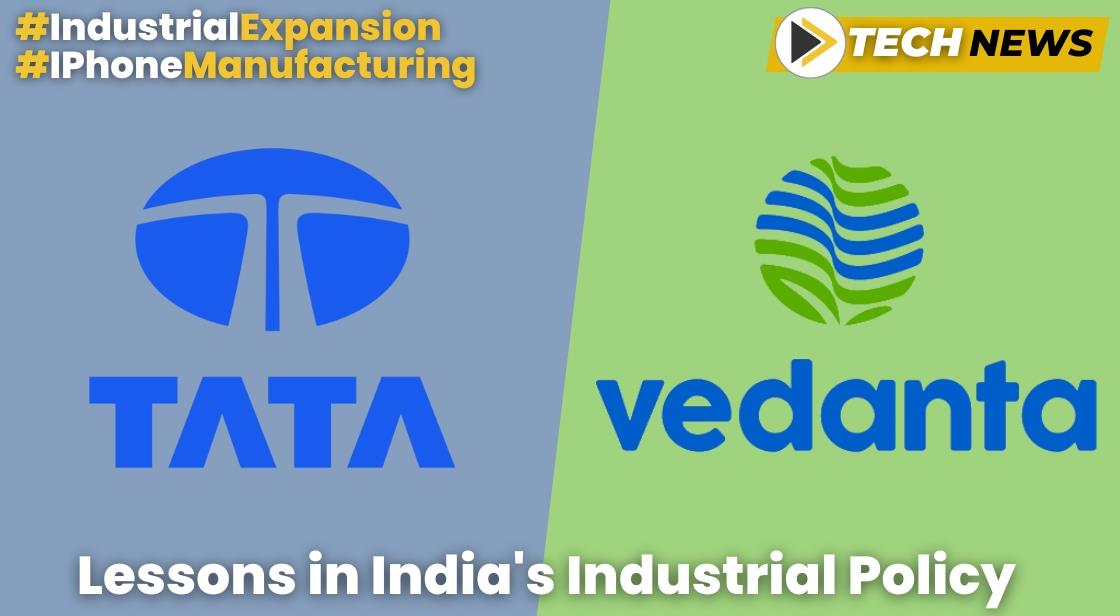Tata and Vedanta: Lessons in India's Industrial Policy

News Synopsis
Tata Group's $125 million deal to enter iPhone manufacturing and Vedanta Ltd's ambitious pivot into semiconductors present valuable lessons in Indian industrial policy. Both initiatives face distinct challenges and opportunities, showcasing the complexities of diversification within India's business landscape.
Tata's Strategic Move into iPhone Manufacturing
Tata's Approach: Tata's strategic approach involves acquiring Wistron Corp's facility to assemble iPhones, positioning itself as a key player in the global smartphone market. While the global smartphone industry faces challenges, Tata's expertise in precision components production gives it a solid foundation.
Competition in India: Tata faces fierce competition from Taiwan's Foxconn and Pegatron, which are also expanding their operations in India. The competitive landscape necessitates a comprehensive strategy for success.
Vedanta's Bid for Semiconductors:
Vedanta's Ambitious Plans: Vedanta, led by billionaire Anil Agarwal, aspired to venture into semiconductors, partnering with Foxconn. The ambitious project aimed to establish a chip factory in Gujarat, but it presented significant challenges and discrepancies.
Investment and Employment Mismatch: Initial figures indicated a massive investment of around $20 billion and an unrealistic projection of 100,000 employees. The semiconductor sector is known for its capital-intensive nature, making Vedanta's plans appear disconnected from industry norms.
Challenges in the Semiconductor Industry:
Global Competition: Global semiconductor giants like Taiwan Semiconductor Manufacturing Co operate with a minimal workforce, emphasizing the stark difference in Vedanta's employment projections. Competing on a global scale requires aligning with industry standards.
Nationalism and Subsidies: Government initiatives and concerns around national security have led to substantial subsidies for semiconductor manufacturers worldwide. Tokyo's efforts to establish local rivals and Beijing's commitment to semiconductor independence indicate fierce global competition.
The Right Path for Vedanta:
Embracing Basics: Vedanta's path towards diversification should start with mastering the fundamentals of semiconductor-related industries. Testing, packaging, and assembly represent promising avenues for growth, echoing the strategy of Micron Technology Inc in Gujarat.
Product Assembly Opportunity: Similar to Tata's approach, Vedanta can explore product assembly, aligning with the global trend of reducing reliance on Chinese manufacturing. This field holds significant potential for Indian investments.
Industrial Policy Lessons: The imperative for Indian businesses to diversify and revitalize their operations is evident. However, effective industrial policy should be rooted in practicality rather than headline-grabbing ambitions.
Relevant and Latest Facts:
-
Tata Group acquired Wistron's iPhone assembly plant in India in October 2023.
-
Vedanta announced plans to build a $20 billion semiconductor factory in Gujarat in October 2022, but Foxconn withdrew its support in April 2023.
-
Taiwan Semiconductor Manufacturing Co (TSMC) is the world's largest dedicated chipmaker.
-
Formosa Plastics Group is one of the world's biggest memory-chip makers.
-
Governments around the world are funding new semiconductor facilities in an effort to reduce their reliance on China.
Conclusion:
Overall, Tata Group's acquisition of Wistron's iPhone assembly plant in India is a case study in successful industrial policy, while Vedanta's plans to pivot into semiconductors are unrealistic and ill-advised. Tata should leverage its expertise in precision components to build a vertically integrated electronics business, while Vedanta should focus on more labor-intensive businesses like testing, packaging, and assembly.
Tata and Vedanta exemplify the dynamic nature of India's industrial policy landscape. While Tata's strategic acquisition aligns with its core competencies, Vedanta's pursuit of semiconductor fabrication highlights the need for a more measured approach in industrial diversification.
You May Like









